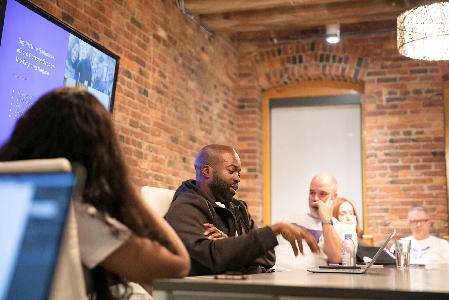Dennis Paskel, now an applications engineer at Vanguard, has lived many lives in his 34 years.
He got his first job in retail at 16 years old. Then, at 18, he enrolled in the US Army. Between 2006 and 2008, he worked as a military police officer, which took him around the world. He eventually returned home to the Philadelphia area, eager to see family and friends.
“Honestly, I think at any age it’s hard to imagine where careers could take you,” Paskel said during a Veteran’s Day AMA interview last Thursday on Technical.ly’s public Slack. “I always believed in life as a journey, and careers are stepping stones in that journey. It’s helped my really grow and mature over the years.”
Since coming back to the area, Paskel has worked in IT support while earning a degree in criminal justice and political science at Temple University. He’s held roles in sales at Comcast, as a bank teller and as a probation and parole officer. In January of this year, he decided to pursue a career he’d always been fascinated with — tech — by joining Tech Elevator‘s local bootcamp.
Take a peak into the interview about his career trajectory below. It’s been lightly edited for length and clarity, but you can check out the full length conversation over on Slack.
Join the Technical.ly SlackHad you thought about what a civilian career might look like when you were in the military?
Dennis Paskel: I hadn’t really given much thought to that. At the time I joined the military to pay for college. I don’t even think I had in my mind an idea of what a career looked like at the time, all I knew is that I wasn’t going to make a career out of serving in the military. The amount of sacrifices service members make on a day to day basis is really overlooked as a civilian.
How was it stepping out of that role and entering the mindset that there were lots of possibilities of career paths to follow?
DP: Whats a stronger word than overwhelming? Because I don’t think that could even convey the feeling of adjusting to life as a civilian. Here I am, 21 years old, coming out of the most rigid and structured experience, and handed back my freedom to do with as I pleased. It definitely took some time to find direction and sense of purpose.
I used to think as a child that adults had all the answers. Then I learned that they didn’t; they just had more experience. That experience is what teaches us to hopefully make better decisions. I wish I would have listened to myself sooner, because I’d be where I’m at now, many years ago. At the same time, I have a great appreciation for all the perspective and insight it’s given me.
I think it’s a universal experience that we think growing up is going to give us all the answers. So what made you start considering tech?
DP: I’ve always been interested in technology. I began assembling and fixing computers when I was 12 years old. I spent four years in computer programs at a vocational tech school while I attended high school. Fear of the unknown is what prevented me from pursuing it as a career all these years.
What changed this year when you joined the Tech Elevator bootcamp? Did it align with what you thought tech would be like?
DP: Tech Elevator provides a full-stack curriculum. Some of their campuses provide students the choice between C# or Java for the backend. The Philadelphia location at the time I went offered only Java, which I would have chosen anyways. We also learned PostgreSQL, JavaScript, and a frontend framework called Vue. For our final capstone, students were broken up into groups and built a full fledged web application.
Joining a bootcamp was the first step necessary for me to pursue a career I would come to love. I think coding bootcamps are a great way for people with life experience to break into the industry. It’s intimidating at first. I left a field that I had a wealth of knowledge in, and I dedicated 10-12 hours a day to learning new skills. Being in a bootcamp meant I wasn’t alone. I had 27 other classmates in the same situation, and we always helped one another.
Tech Elevator did a great job of simulating what working in tech would be like. Additionally, they brought in companies to speak to us about how tech is used in the company, and what it’s like working there. We then had 10 employers come for Tech Elevator’s matchmaking event, where I had the opportunity to interview with a few companies of my choice, and ultimately led to me getting hired with Vanguard.
Were there skills from the military that translated well into tech?
DP: I think the skill that’s translated the best for me has been attention to detail. In the military, especially during war, the smallest overlooked details could get you and/or others severely injured or killed. I carry that level of detail in all of my work, sometimes a little too meticulously.
What advice would you give your younger self, or maybe anyone unsure about the next step in their career, having tried so many?
DP: I think I would tell my younger self to believe in myself more. My concern for not pursing a career in tech sooner was the fear of jobs being outsourced and me being laid off or not having a stable career. I sold my happiness for stability, and that’s something I’d never do again. There are such things in life as good risks, and sometimes we need to take a leap of faith and believe in ourselves. It’s the only way to achieve our full potential.
Most importantly, it’s never too late to change courses in life. Being a probation and parole officer for five years, I got to see people of all walks of life and different ages change their life for the better. If they could do it, surely any of us can change careers and pursue what makes us truly happy and fulfilled.
You’re more likely to regret the choices you didn’t make in life. Take chances, take advantage of opportunities available, reach out and connect with others and learn from them, find what makes you happy in life and chase after it. If you fall, dust yourself off and get up. The best time to plant a tree was 20 years ago, the second best time is now.
Join the Technical.ly Slack
This editorial article is a part of How to Get a Tech Job Month of Technical.ly's editorial calendar. This month’s theme is underwritten by Flatiron School. This story was independently reported and not reviewed by Flatiron before publication.
Before you go...
Please consider supporting Technical.ly to keep our independent journalism strong. Unlike most business-focused media outlets, we don’t have a paywall. Instead, we count on your personal and organizational support.
Join our growing Slack community
Join 5,000 tech professionals and entrepreneurs in our community Slack today!




